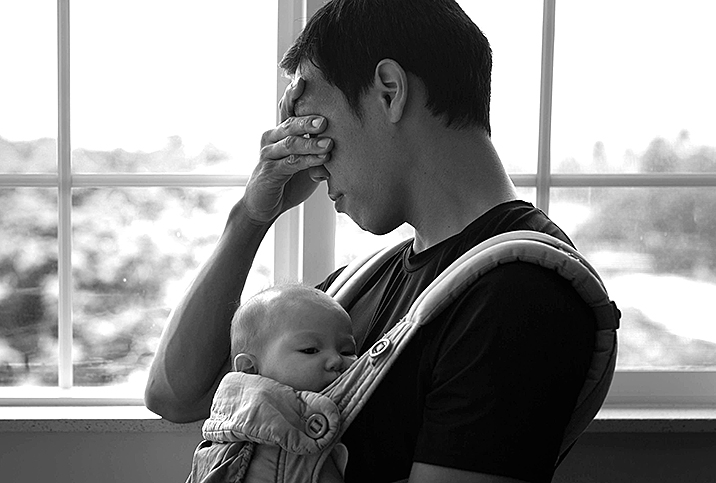Advice for Men About Postpartum Depression

If you are a new parent (or an experienced parent with a newborn child, for that matter), you know that the period of time following the birth can be as tumultuous as it can be exciting. However, postpartum depression (PPD) is a reality that you should be ready for.
While mental health issues that persist after birth are prevalent in both male and female parents, mothers who have recently given birth often experience a host of biological, mental and societal changes that can complicate emotional or physical well-being.
When this happens, it's important to have a partner who can step up and handle the pressure of being both a parent and at least one-half of the partnership. This is no easy task, though, and there's no simple recipe for success in doing so. There are a few things to keep in mind, however, that can help you formulate your own strategy for successful support and encouragement while dealing with postpartum depression.
Use supportive communication
Every person requires a different type of support when it comes to issues involving mental health, so there is no rulebook for communicating effectively when your partner is dealing with depression in any form. Postpartum depression can be particularly unique, so even if you've had prior experience dealing with mental health issues, traditional communication methods may not be successful.
There are some suggestions that may be of help in determining your partner's needs, communicatively or otherwise, when engaging with the challenge of a newborn child. First, it is important to try and maintain a calm, level-headed attitude when engaging with your partner. While rapid shifts in mood and the emergence of unexpected conflicts can challenge your ability to hold fast to this guidance, these circumstances make your even-keeled approach to responsiveness all the more critical.
When looking to provide support to a partner dealing with PPD, it's important not only to ask questions about how you can behave or what actions you can take to be helpful, but also to respond affirmatively and express your interest in meeting those needs. This requires considerate and close listening. Never assume you know your partner well enough to fill the gaps in communication and be sensitive when you ask for further clarification.
While this may seem like contradictory advice, it's also important to exercise your intuition. Recognize that your partner's mental health may create obstacles in their ability to be expressive and may not consider all of their own needs. Anticipating potential issues around the house or the needs of the baby will proactively ease tension.
Little things can add up to a lot of support, and communication is not always about what is said or not said between individuals. Small gestures and acts of kindness can be a highly effective method for communicating your intentions when it comes to supporting your partner on the journey to recovery. If you're unsure of what to say or do, small tasks like keeping the house clean, caring for the baby or simply making necessary phone calls and maintaining a schedule go a long way.
Lastly, try not to do things that prevent your partner from getting the rest they need. The birth of a child can have devastating effects on the short- or long-term status of a person's vitality and stamina. This is not the time to be absent or to engage in activities that make it harder for your partner to recuperate. Not only can this have a damaging impact on their overall mental and physical health, but it also communicates a lack of prioritization for your partner and the newborn, which can make your partner feel unvalued, underappreciated and overwhelmed.
Refrain from unsolicited guidance
It can be tempting to offer advice to your partner while observing the havoc postpartum depression can have on their well-being. While you may know your partner exceptionally well under normal circumstances, and you may even have a wealth of knowledge at your disposal when it comes to addressing mental health issues, this type of potentially overbearing guidance may be interpreted differently than intended when PPD is a factor.;
Postpartum depression tends to create a complicated array of emotions, including anxiety, depression, self-doubt and even aggressive feelings that can manifest as combative behavior and dialogue. At these times, patience is much more critical than any clever replies or blame-shifting explanations.
If your partner is experiencing PPD, hopefully their medical provider has also helped facilitate the assistance of a mental health counselor or psychological professional. If this is the case, keep out of the way and allow them to do their job in private sessions or couples counseling, as needed.
The advice provided by a medical professional should not be interrupted or contradicted by anyone in the household or family/social network. Sometimes, PPD needs to be addressed with medications or other routine behaviors as dictated by the person providing professional support to your partner. The recommendations may not always be what you want to hear or go along with, but you'll only prolong or exacerbate the already difficult emotional status of the person suffering from postpartum depression if you don't comply.
Get help (where it counts)
A newborn baby can be a blessing for either parent in the relationship but can also cause emotional turbulence for both people. Postpartum depression can also be a real issue for nonchildbearing members of a household in addition to maternal figures. Statistics show postpartum depression symptoms occur in fathers and nonchildbearing partners in anywhere from 10 to 50 percent of households with a newborn.
Ignoring your own symptoms will do you no favors, especially when it comes to acknowledging and providing support for your partner's struggle. By disregarding the experience you're having, you may become less able to be attentive and intuitive to your partner's needs. You may also cause feelings of stress and anxiety to be exaggerated in your partner if they perceive that the new child-rearing experience is having a negative impact on you or your relationship.
This is not to say that you should paint a smile on your face and shoulder through your feelings. Just as it is important to allow your partner to seek the help they need, you must do the same. Try to balance your attempts to be present and accountable to the situation with your own very real needs for solitary time and, if necessary, professional help or support from a close friend or family member.


















